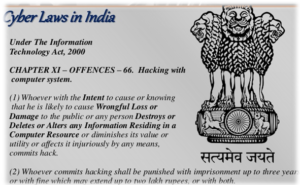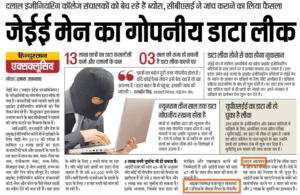ARTICLE ON CYBER LAW AND CRIMES
Author: Prashant Kumar Singh, LL.B-2nd Year
IT ACT OF INDIA 2000
In May 2000, both the houses of the Indian parliament passed the Information Technology Bill. The Bill received the assent of the president in August 2000 and come to be known as the Information technology Act, 2000 cyber Law Contained in the IT Act, 2000. Basically, IT Act established for the Commercial Purpose. It is enacted with a view to give a fillip to the growth of electronic e-governance, to prevent computer based crime or in any electronic way and ensure security practices and procedures in the context of widest possible use of Information Technology worldwide.
Introduction
Cyber Crime can be easily defines in a simple way, committing a crime wherein computers is either a tool or a target or both. Cyber Crimes involve criminal activities that are traditional in nature, such as theft, fraud, forgery, defamation and Mischief are which subjected to the INDIAN PENAL CODE. The abuse of computers has also given birth to a gamut of new age crimes that are addressed by the Information Technology Act, 2000. E.g. – Hacking, Virus/worm attacks, DOS attack etc.
The Encyclopedia Britannica defines Cyber Crimes as any crime that is committed by means of special knowledge or expert use of computer technology. United Nation Manual on prevention and control of computer crime and Oxford Reference Online gives list of Cyber Crimes committed over internet.
“Computer is weapon using a computer to commit real world crimes. E.g. – Cyber Terrorism, IPR Violation, Copyright, Credit Card Frauds, EFT Frauds and Pornography etc. “
Technological advancements have created new possibilities for criminal activity, in particular the commercial misuse of Information technology such as:-
- Unauthorized Access and Hacking.
- Virus and Worm Attack.
- Trojan Attack.
- E-Mail and IRC related crimes.
- Email Spoofing.
- Email Bombing.
- Defamatory Emails.
- Email Frauds.
- IRC Related.
- Email Spanning.
- Sending Threatening Emails.
NATIONAL POLICY ON INFORMATION TECHNOLOGY, 2012
The Union Cabinet has past recently in September 2012, approved the National Policy on IT ACT 2012. The policy aims to leverage Information and communication Technology (ICT) to address the country’s economic and developmental challenges. The Vision of the policy is “To strengthen and enhance India’s position as the Global IT hub and to use IT and cyber space as an engine for rapid, inclusive and substantial growth in the national economy”. The Policy envisages among other objectives, to increase revenues of IT and ITES Industry from 100 Billion USD at present to 300 Billion USD by 2020 and expand exports from 69 Billion USD at Present to 2000 USD by 2020.It also aims to create a pool of 10 million additional skilled manpower in ICT.
CYBER LAW ENCOMPASSESSES LAWS RELATING TO-
- Cyber Crimes.
- Electronic and digital signatures.
- Intellectual Property.
- Data Protection.
CYBER LAW IN INDIA
In India, cyber law are contained in the information in the IT ACT 2000 which came into force on October 17, 2000.The main purpose to provide legal recognition to electronic commerce and to facilitate filing of electronic records with the govt.The information Technology Act is an outcome of the resolution dated 30th January 1997 of the General Assembly of the United Nations, which adopted the Model Law on Electronic Commerce, adopted the Model Law on Electronic Commerce on International Trade Law. This resolution recommended, inter alia, that all states give favorable consideration to the said Model Law while revising enacting new law, so that uniformity may be observed in the laws,of the various cybernation’s, applicable to alternatives to paper based methods of communication and storage of information. The Department of Electronics (DoE) in July 1998 drafted the bill. However, it could only be introduced in the House on December 16, 1999 (after a gap of almost one and a half years) when the new IT Ministry was formed. It underwent substantial alteration, with the Commerce Ministry making suggestions related to ecommerce and matters pertaining to World Trade Organization (WTO) obligations. The Ministry of Law and Company Affairs then vetted this joint draft. After its introduction in the House, the bill was referred to the 42member Parliamentary Standing Committee following demands from the Members. The Standing Committee made several suggestions to be incorporated into the bill. However, only those suggestions that were approved by the Ministry of Information Technology were incorporated. One of the suggestions that was highly debated upon was that a cyber café owner must maintain a register to record the names and addresses of all people visiting his café and also a list of the websites that they surfed. This suggestion was made as an attempt to curb cybercrime and to facilitate speedy locating of a cyber-criminal. However, at the same time it was ridiculed, as it would invade upon a net surfer’s privacy and would not be economically viable. Finally, this suggestion was dropped by the IT Ministry in its final draft.The Union Cabinet approved the bill on May 13, 2000 and on May 17, 2000, both the houses of the Indian Parliament passed the Information Technology Bill. The Bill received the assent of the President on 9th June 2000 and came to be known as the Information Technology Act, 2000. The Act came into force on 17th October 2000. With the passage of time, as technology developed further and new methods of committing crime using Internet & computers surfaced, the need was felt to amend the IT Act, 2000 to insert new kinds of cyber offences and plug in other loopholes that posed hurdles in the effective enforcement of the IT Act, 2000. This led to the passage of the Information Technology (Amendment) Act, 2008 which was made effective from 27 October 2009. The IT (Amendment) Act, 2008 has brought markedchanges in the IT Act, 2000 on several counts.
Source: Data of Cyber Crime in India by Site NCRB
.
Disclaimer:
This Article was prepared or accomplished by Prashant Kumar Singh in his personal capacity. The opinions expressed in this article are the author’s own and do not reflect the view of the LawOF.in
The Contents of this Website are informative only and for the benefit of the general public. Even though every care has been taken to ensure the correctness of information and procedure, the www.lawof.in is not responsible for any inadvertent errors and the same may please be brought to the notice through e-mail: info@lawof.in The LawOF do not own any responsibility for the views expressed by the Author in the Article and for the errors, if any, in the information contained in the LawOF and the author shall be solely responsible for the same.
.
 4521
4521




374 comments
Comments are closed.